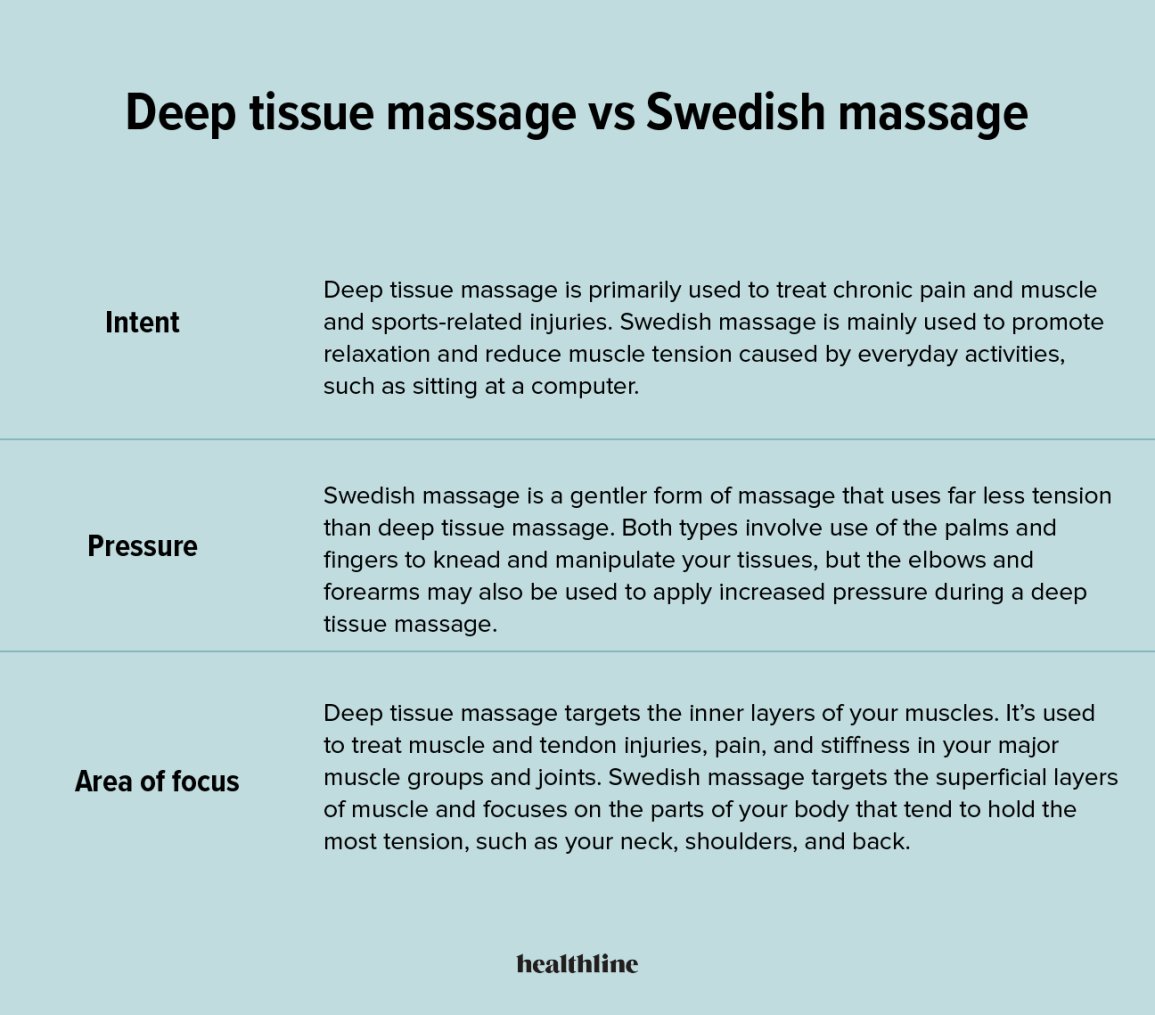When you get a massage, your body releases endorphins and oxytocin, which are hormones that promote relaxation and reduce stress. This natural response helps to elevate mood, alleviate pain, and induce a sense of well-being, making massage therapy an effective way to improve both physical and mental health.
A massage not only relieves muscle tension but also triggers the release of serotonin and dopamine, which contribute to feelings of happiness and satisfaction. The increase in blood flow and circulation during a massage also stimulates the release of toxins from the body and aids in the removal of waste products.
All these physiological responses contribute to the overall positive impact of massage on the body and mind. Whether it’s through a relaxing Swedish massage or a deep tissue session, the benefits of this therapeutic practice extend far beyond the physical manipulation of muscles.

Credit: www.everydayhealth.com
1. The Power Of Touch
1. The Power of Touch
The Science Behind Massage
A massage is more than just a relaxing experience; it also involves a scientific process that affects your body on a physiological level. When a skilled massage therapist applies pressure and manipulates your muscles, it triggers a cascade of biological responses. The physical manipulation of the body’s soft tissues stimulates receptors in the skin and muscles, sending signals to the brain to release a flood of neurotransmitters and hormones that contribute to feelings of relaxation and well-being.
Benefits Of Human Touch
The human touch has the power to calm the nervous system, reduce stress, and even enhance immune function. Research has shown that regular physical contact can lead to decreased levels of cortisol, the stress hormone, and increased levels of oxytocin, the “bonding hormone.” This means that a soothing massage not only provides immediate relaxation but also has lasting effects on your overall well-being. It is a natural way to boost your mental and physical health.
2. The Release Of Endorphins
When you receive a massage, your body experiences a natural and soothing release of endorphins, providing both physical and psychological benefits. Understanding the function of endorphins and how massage stimulates their release can help you appreciate the positive impact of a massage on your overall well-being.
2.1 Understanding Endorphins
Endorphins are your body’s natural pain-relieving hormones, often referred to as “feel-good” chemicals. They are primarily produced in the pituitary gland and central nervous system and act as neurotransmitters, transmitting signals within the brain. Endorphins play a crucial role in reducing pain, enhancing pleasure, and promoting an overall sense of well-being, contributing to the calming and euphoric feelings you experience after a satisfying massage.
2.2 How Massage Stimulates Endorphin Release
Massage therapy promotes the release of endorphins through various mechanisms, including the application of pressure to specific points on the body, the manipulation of soft tissue, and the stimulation of sensory receptors. This physical manipulation triggers the release of endorphins as a natural response to relieve pain and induce relaxation, thereby amplifying the positive effects of the massage and contributing to a state of heightened comfort and tranquility.
3. The Reduction Of Stress Hormones
A massage triggers the release of stress hormones in your body, leading to a reduction in their levels. This helps promote relaxation and alleviate stress.
When you get a massage, your body goes through various physiological changes that can have a profound impact on your overall well-being. One of the key benefits of massage therapy is its ability to reduce stress hormones, such as cortisol, in the body. In this section, we will explore the role of cortisol in the stress response and how massage affects its levels.3.1 Cortisol And The Stress Response
Cortisol, often referred to as the “stress hormone,” is produced by the adrenal glands in response to stress. When you experience a stressful situation, your body releases cortisol to help you cope with the perceived threat. While cortisol is essential for your body’s stress response, prolonged or excessive levels of this hormone can have detrimental effects on your health.3.2 Massage’s Impact On Cortisol Levels
Massage therapy has been shown to have a significant impact on cortisol levels in the body. Research studies have consistently demonstrated that receiving regular massages can lead to a decrease in cortisol levels and an increase in the production of “feel-good” hormones, such as serotonin and dopamine.Massage stimulates the parasympathetic nervous system, which is responsible for promoting relaxation and restorative processes in the body. This activation of the parasympathetic nervous system helps to counteract the effects of the sympathetic nervous system, which is responsible for the “fight or flight” response associated with stress.
Massage also promotes the release of other neurotransmitters, like endorphins, which are natural pain-relieving and mood-enhancing substances. These neurochemical changes contribute to an overall sense of relaxation, reduced anxiety, and improved mood.
Moreover, the physical manipulation of the muscles and soft tissues during a massage helps to break down adhesions and knots. This release of tension and physical stress further contributes to the reduction of cortisol levels.
In conclusion, getting a massage can significantly reduce stress hormones such as cortisol, resulting in a more relaxed and balanced state of being. The combination of physical touch, relaxation, and the release of “feel-good” hormones makes massage therapy an effective tool for managing stress and promoting overall well-being.
4. The Increase In Serotonin And Dopamine
Serotonin and dopamine levels rise during a massage, contributing to feelings of relaxation and well-being.
4.1 The Link Between Serotonin, Dopamine, And Mood
Serotonin regulates mood and promotes feelings of happiness, while dopamine is associated with pleasure and reward.
4.2 How Massage Promotes Serotonin And Dopamine Release
- Massage therapy stimulates the release of serotonin and dopamine in the brain.
- Pressure applied during massage triggers neural pathways that enhance serotonin and dopamine production.
- Studies show that regular massages can help maintain optimal levels of these neurotransmitters.
This natural boost in serotonin and dopamine is one of the reasons why massages are effective for reducing stress and improving mood.
5. The Relaxation Response
When you get a massage, your body releases the relaxation response, leading to reduced levels of stress hormones and increased production of feel-good chemicals such as serotonin and endorphins. These natural responses promote relaxation, improve mood, and alleviate pain, supporting overall well-being.
In response to a massage, your body initiates the relaxation response, triggering a cascade of physiological changes that promote wellness and relaxation.5.1 Activating The Relaxation Response Through Massage
By applying gentle pressure to your muscles, massage therapy stimulates the parasympathetic nervous system, inducing a state of deep relaxation.5.2 The Physiological Benefits Of The Relaxation Response
– Decreased heart rate: As your body relaxes, your heart rate slows down, promoting a sense of calmness. – Reduced cortisol levels: Massage helps lower stress hormone levels, alleviating feelings of tension and anxiety. – Enhanced immune function: The relaxation response supports a stronger immune system, improving your body’s ability to fight off illness.
Credit: pamperedspirit.com

Credit: m.facebook.com
Frequently Asked Questions On What Does Your Body Release When You Get A Massage
What Happens To Your Body When You Get A Massage?
During a massage, your body experiences increased blood circulation, reduced muscle tension, and improved flexibility. It also triggers the release of endorphins, providing pain relief and promoting relaxation. Moreover, it can help in reducing stress and anxiety.
What Hormones Does Massage Therapy Release?
Massage therapy releases hormones such as endorphins, serotonin, and oxytocin, which promote relaxation and reduce stress. These hormones help improve mood, reduce pain, and enhance overall well-being.
Does Massage Release Trapped Emotions?
Yes, massage can help release trapped emotions by relaxing the body and mind, promoting emotional release.
What Happens To Your Brain During A Massage?
During a massage, the brain releases endorphins that reduce stress and promote relaxation. Blood flow increases, enhancing cognitive function.
Conclusion
Getting a massage can have remarkable effects on your body. It not only helps to alleviate stress and muscle tension but also causes the release of various beneficial substances such as endorphins and oxytocin. These natural chemicals promote relaxation, pain relief, and a sense of well-being.
Furthermore, the increase in circulation during a massage aids in the removal of toxins and waste products from the body. So, don’t underestimate the power of a good massage in enhancing your overall health and mood.



